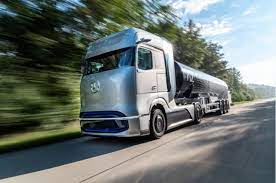
According to Daimler Truck Chief Executive Martin Daum, in the next 15 years, about half the jobs at Europe's truck engine plants will be lost because of the transition to zero emission fuel cell trucks.
Daum consequently urged policymakers to take preparations for that eventuality starting now.
The makers of trucks throughout the world are slowly but surely moving towards achieving a zero emission target as achieving tougher sustainability targets has assumed more importance for the customers of the companies. But since less moving parts are present in the fuel cell powered vehicles, therefore less labour is required compared to making the conventional combustion engines.
"We have to be cognizant that about 50% of the jobs will go away because a fuel cell and a battery are far less complex than a diesel engine and a transmission today," Daum said in a media interview.
"But the good thing is, we have a transition period of about 15 years and we have to start preparing for that today."
The German based largest truck maker of the world is pushing very hard to development and manufacturing of electric and hydrogen fuel cell powered vehicles. The company has set a target of accelerating its zero emission trucks such as that 60 per cent of all the vehicles it sells are zero emission vehicles by 2030 and then make only zero emission trucks by 2039.
But to persuade sceptical fleet operators to purchase the zero emissions trucks - which ultimately will help Europe to achieve its climate goals, it is crucial to build hydrogen fuelling infrastructure, Daum said.
"If we already had the trucks today that we will have in 2025 and beyond, we wouldn't sell a single one. Why? Because we have no hydrogen fuelling network," he said.
An agreement between Shell and Daimler AG's truck unit was announced this week according to which the oil major will launch heavy duty hydrogen refuelling stations that would be set up between the green hydrogen production hubs at the Port of Rotterdam in the Netherlands and in Cologne and Hamburg in Germany starting 2024.
Last month, a call for EU policies to boost fuelling infrastructure was given by the German company and rival Volvo AB.
"The fear of running out of power is the issue where the customer is the most sceptical," Daum said. "The decisive edge will be the availability of fuelling infrastructure."
Later this year, Daimler Truck will be spun off from carmaker Daimler with the aim of increasing its appeal for investors as it as a car making company that is focused on the electric luxury car business.
It would focus on increasing its profit margins by 2025, particularly for its business operations in Europe, prior to the aforesaid spin off, Daimler Truck said.
Cutting product costs and improving its service quality, were at the core of the problems of the company in Europe, Daum said.
"We have a good product in Europe, it's too expensive to produce," he said. "So we have to get the complexity out of the product."
(Source:www.saltwire.com)
Daum consequently urged policymakers to take preparations for that eventuality starting now.
The makers of trucks throughout the world are slowly but surely moving towards achieving a zero emission target as achieving tougher sustainability targets has assumed more importance for the customers of the companies. But since less moving parts are present in the fuel cell powered vehicles, therefore less labour is required compared to making the conventional combustion engines.
"We have to be cognizant that about 50% of the jobs will go away because a fuel cell and a battery are far less complex than a diesel engine and a transmission today," Daum said in a media interview.
"But the good thing is, we have a transition period of about 15 years and we have to start preparing for that today."
The German based largest truck maker of the world is pushing very hard to development and manufacturing of electric and hydrogen fuel cell powered vehicles. The company has set a target of accelerating its zero emission trucks such as that 60 per cent of all the vehicles it sells are zero emission vehicles by 2030 and then make only zero emission trucks by 2039.
But to persuade sceptical fleet operators to purchase the zero emissions trucks - which ultimately will help Europe to achieve its climate goals, it is crucial to build hydrogen fuelling infrastructure, Daum said.
"If we already had the trucks today that we will have in 2025 and beyond, we wouldn't sell a single one. Why? Because we have no hydrogen fuelling network," he said.
An agreement between Shell and Daimler AG's truck unit was announced this week according to which the oil major will launch heavy duty hydrogen refuelling stations that would be set up between the green hydrogen production hubs at the Port of Rotterdam in the Netherlands and in Cologne and Hamburg in Germany starting 2024.
Last month, a call for EU policies to boost fuelling infrastructure was given by the German company and rival Volvo AB.
"The fear of running out of power is the issue where the customer is the most sceptical," Daum said. "The decisive edge will be the availability of fuelling infrastructure."
Later this year, Daimler Truck will be spun off from carmaker Daimler with the aim of increasing its appeal for investors as it as a car making company that is focused on the electric luxury car business.
It would focus on increasing its profit margins by 2025, particularly for its business operations in Europe, prior to the aforesaid spin off, Daimler Truck said.
Cutting product costs and improving its service quality, were at the core of the problems of the company in Europe, Daum said.
"We have a good product in Europe, it's too expensive to produce," he said. "So we have to get the complexity out of the product."
(Source:www.saltwire.com)





